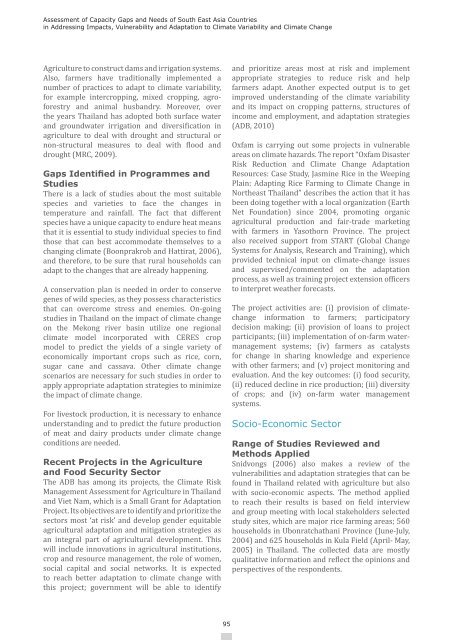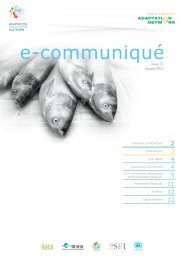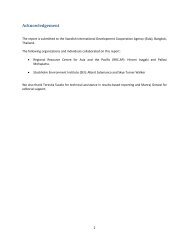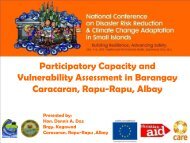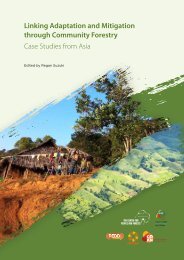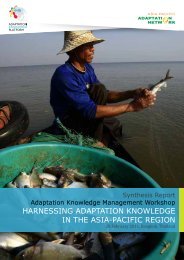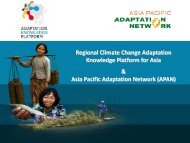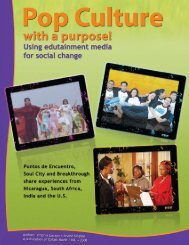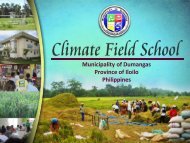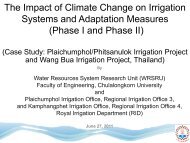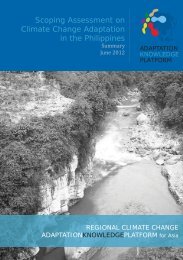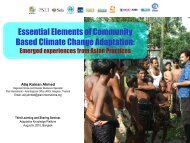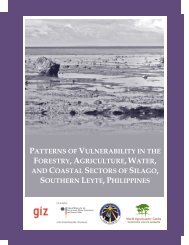Desktop Study on - Regional Climate Change Adaptation ...
Desktop Study on - Regional Climate Change Adaptation ...
Desktop Study on - Regional Climate Change Adaptation ...
You also want an ePaper? Increase the reach of your titles
YUMPU automatically turns print PDFs into web optimized ePapers that Google loves.
Assessment of Capacity Gaps and Needs of South East Asia Countries<br />
in Addressing Impacts, Vulnerability and Adaptati<strong>on</strong> to <strong>Climate</strong> Variability and <strong>Climate</strong> <strong>Change</strong><br />
Agriculture to c<strong>on</strong>struct dams and irrigati<strong>on</strong> systems.<br />
Also, farmers have traditi<strong>on</strong>ally implemented a<br />
number of practices to adapt to climate variability,<br />
for example intercropping, mixed cropping, agroforestry<br />
and animal husbandry. Moreover, over<br />
the years Thailand has adopted both surface water<br />
and groundwater irrigati<strong>on</strong> and diversificati<strong>on</strong> in<br />
agriculture to deal with drought and structural or<br />
n<strong>on</strong>‐structural measures to deal with flood and<br />
drought (MRC, 2009).<br />
Gaps Identified in Programmes and<br />
Studies<br />
There is a lack of studies about the most suitable<br />
species and varieties to face the changes in<br />
temperature and rainfall. The fact that different<br />
species have a unique capacity to endure heat means<br />
that it is essential to study individual species to find<br />
those that can best accommodate themselves to a<br />
changing climate (Bo<strong>on</strong>prakrob and Hattirat, 2006),<br />
and therefore, to be sure that rural households can<br />
adapt to the changes that are already happening.<br />
A c<strong>on</strong>servati<strong>on</strong> plan is needed in order to c<strong>on</strong>serve<br />
genes of wild species, as they possess characteristics<br />
that can overcome stress and enemies. On-going<br />
studies in Thailand <strong>on</strong> the impact of climate change<br />
<strong>on</strong> the Mek<strong>on</strong>g river basin utilize <strong>on</strong>e regi<strong>on</strong>al<br />
climate model incorporated with CERES crop<br />
model to predict the yields of a single variety of<br />
ec<strong>on</strong>omically important crops such as rice, corn,<br />
sugar cane and cassava. Other climate change<br />
scenarios are necessary for such studies in order to<br />
apply appropriate adaptati<strong>on</strong> strategies to minimize<br />
the impact of climate change.<br />
For livestock producti<strong>on</strong>, it is necessary to enhance<br />
understanding and to predict the future producti<strong>on</strong><br />
of meat and dairy products under climate change<br />
c<strong>on</strong>diti<strong>on</strong>s are needed.<br />
Recent Projects in the Agriculture<br />
and Food Security Sector<br />
The ADB has am<strong>on</strong>g its projects, the <strong>Climate</strong> Risk<br />
Management Assessment for Agriculture in Thailand<br />
and Viet Nam, which is a Small Grant for Adaptati<strong>on</strong><br />
Project. Its objectives are to identify and prioritize the<br />
sectors most ‘at risk’ and develop gender equitable<br />
agricultural adaptati<strong>on</strong> and mitigati<strong>on</strong> strategies as<br />
an integral part of agricultural development. This<br />
will include innovati<strong>on</strong>s in agricultural instituti<strong>on</strong>s,<br />
crop and resource management, the role of women,<br />
social capital and social networks. It is expected<br />
to reach better adaptati<strong>on</strong> to climate change with<br />
this project; government will be able to identify<br />
and prioritize areas most at risk and implement<br />
appropriate strategies to reduce risk and help<br />
farmers adapt. Another expected output is to get<br />
improved understanding of the climate variability<br />
and its impact <strong>on</strong> cropping patterns, structures of<br />
income and employment, and adaptati<strong>on</strong> strategies<br />
(ADB, 2010)<br />
Oxfam is carrying out some projects in vulnerable<br />
areas <strong>on</strong> climate hazards. The report “Oxfam Disaster<br />
Risk Reducti<strong>on</strong> and <strong>Climate</strong> <strong>Change</strong> Adaptati<strong>on</strong><br />
Resources: Case <str<strong>on</strong>g>Study</str<strong>on</strong>g>, Jasmine Rice in the Weeping<br />
Plain: Adapting Rice Farming to <strong>Climate</strong> <strong>Change</strong> in<br />
Northeast Thailand” describes the acti<strong>on</strong> that it has<br />
been doing together with a local organizati<strong>on</strong> (Earth<br />
Net Foundati<strong>on</strong>) since 2004, promoting organic<br />
agricultural producti<strong>on</strong> and fair-trade marketing<br />
with farmers in Yasothorn Province. The project<br />
also received support from START (Global <strong>Change</strong><br />
Systems for Analysis, Research and Training), which<br />
provided technical input <strong>on</strong> climate-change issues<br />
and supervised/commented <strong>on</strong> the adaptati<strong>on</strong><br />
process, as well as training project extensi<strong>on</strong> officers<br />
to interpret weather forecasts.<br />
The project activities are: (i) provisi<strong>on</strong> of climatechange<br />
informati<strong>on</strong> to farmers; participatory<br />
decisi<strong>on</strong> making; (ii) provisi<strong>on</strong> of loans to project<br />
participants; (iii) implementati<strong>on</strong> of <strong>on</strong>-farm watermanagement<br />
systems; (iv) farmers as catalysts<br />
for change in sharing knowledge and experience<br />
with other farmers; and (v) project m<strong>on</strong>itoring and<br />
evaluati<strong>on</strong>. And the key outcomes: (i) food security,<br />
(ii) reduced decline in rice producti<strong>on</strong>; (iii) diversity<br />
of crops; and (iv) <strong>on</strong>-farm water management<br />
systems.<br />
Socio-Ec<strong>on</strong>omic Sector<br />
Range of Studies Reviewed and<br />
Methods Applied<br />
Snidv<strong>on</strong>gs (2006) also makes a review of the<br />
vulnerabilities and adaptati<strong>on</strong> strategies that can be<br />
found in Thailand related with agriculture but also<br />
with socio-ec<strong>on</strong>omic aspects. The method applied<br />
to reach their results is based <strong>on</strong> field interview<br />
and group meeting with local stakeholders selected<br />
study sites, which are major rice farming areas; 560<br />
households in Ub<strong>on</strong>ratchathani Province (June-July,<br />
2004) and 625 households in Kula Field (April- May,<br />
2005) in Thailand. The collected data are mostly<br />
qualitative informati<strong>on</strong> and reflect the opini<strong>on</strong>s and<br />
perspectives of the resp<strong>on</strong>dents.<br />
95


